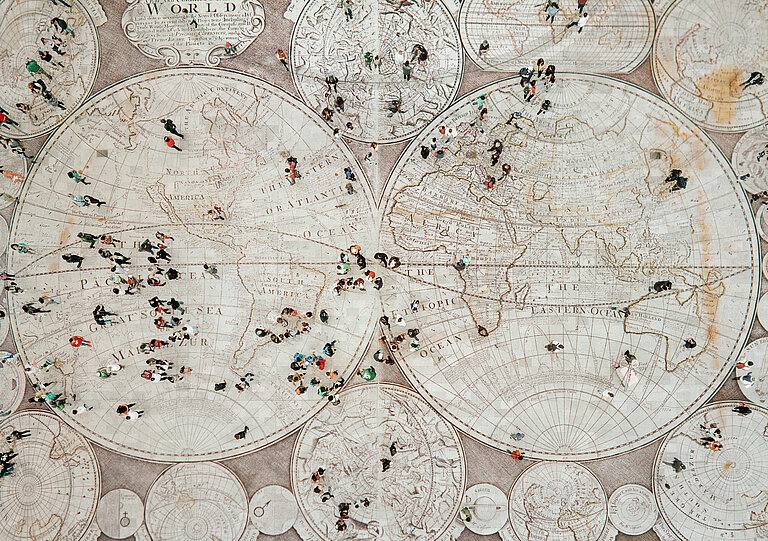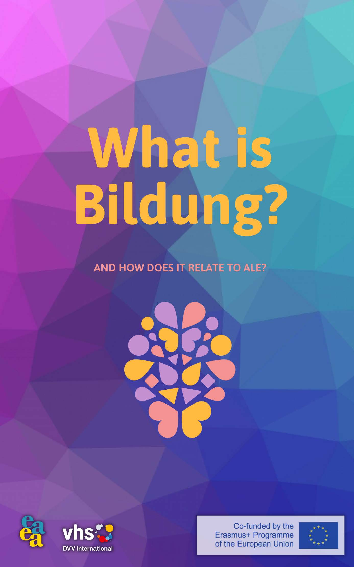BILDUNG – A concept for the future of adult learning and education

Our world is confronted with a multiple set of severe challenges, requiring from all of us the ability to act in a change-oriented way: climate change, the impact of the pandemic, the digital revolution and the growing gaps in our societies – income and wealth, education, discrimination, marginalisation, and lack of legal rights – are some key issues describing our current situation. Adult learning and education (ALE) is entrusted with the task to enable youth and adults to understand, imagine and shape the necessary transitions in a positive way.
ALE can shape the future
In the last decade, at least in Europe, ALE was mainly understood as a service to improve people’s potential to get work and offer them some additional possibilities for basic education. DVV International and the European Association for the Education of Adults (EAEA) – together with European partners from Austria, Denmark, Estonia, Finland, Greece, Ireland, Moldova, Spain and Switzerland – initiated a project that promotes a concept of ALE that goes beyond this traditional understanding. The BILDUNG project intends to provide inspiring and forward-thinking concepts, ideas and good practices for the ALE sector.
The BILDUNG project, funded by the European Union under the Erasmus-programme, wants to revisit and revitalize the ideas developed by thinkers of the enlightenment, ideas which have been implemented in several countries since the 19th century. The main inspiration comes from the experiences of the Nordic Folkbildning movement, which developed an approach to modernize Denmark, Norway, Sweden and Finland, countries which are today among the most advanced regions in the world, while they had been among the poorest and least developed just 200 years ago.
Folkbildning
The Nordic concept of Folkbildning (popular education) was developed in the Scandinavian countries in the 19th century to offer education possibilities for ordinary people (at that time mainly farmers), enabling them to participate actively in public and economic life and contribute to wealth and well-being. Folkbildning aims to create a sense of belonging to a community and a nation. The traditional target groups are youth and adults. Main providers of Folkbildning are residential “Folkhighschools” and study-circles which act as a self-organised form of learning. For more details, visit the website of Studieförbundet Vuxenskolan.
Towards a holistic understanding of ALE
The idea to use these concepts for the ALE sector was develop by the Danish author and philosopher Lene Rachel Andersen. It is based on four main pillars:
- Education, especially ALE, should include all aspects of knowledge including, e.g., ethical thinking, aesthetics, reflections about basic narratives and power relations;
- ALE is more than just the transfer of knowledge, skills and competences, but also includes the attempt to assist learners in their moral and personal development;
- Just like Folkbildning created a national identity in the Nordics back in the 19th century, ALE today has to support citizens to enlarge their understanding of belonging towards a true global citizenship and a sense of responsibility for all life on earth;
- Finally, ALE should empower people to act and shape the future of their families, communities and environments. A prerequisite for this is to overcome fear and the feeling of being overwhelmed by the rapid changes.
The project intends to publish five concept papers on the use of Lene Rachel Andersen’s concept for ALE. The outcomes will be disseminated by the partners at the national level and presented to various stakeholders in two multiplier events.
A first publication which describes the concept in detail was recently released. It can be downloaded here. Additionally, short summaries of the paper have been published in fourteen languages, to be found under the same link. Other publications will be dealing with the use of the approach on topics related to democracy, digitalization, and sustainability as well as in basic education formats.




